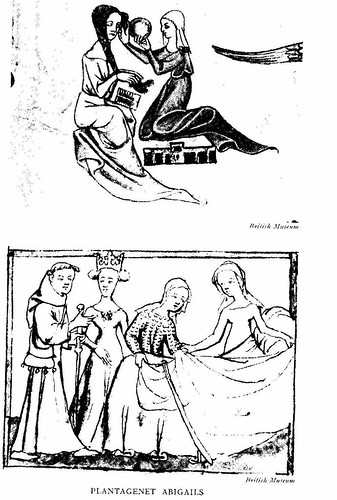This week's acquisitions
Only two this week, possibly because the post is getting even slower than usual.
One is the curiously titled The English Abigail, by Dorothy Margaret Stuart, London, Macmillan & Co, 1946, from which the above illustration is taken. "Abigail" is apparently a term for servant, although I've never heard it before.
It traces from Norman times into Victorian, although its definition of "servant" is rather broad, seemingly from the lowest scullion to the Queen Elizabeth's Chief Gentlewoman, Blanch(e) Parry.
The above illustrations are apparently from the Luttrell Psalter; "We see her kneeling beside a young lady and holding up a round hand-mirror so that the effect of the elaborate head-dress may be seen; we see her helping to make a bed, and stretching out streets which fall into symmetrical, angular convolutions..." (p. 4)
One theme that carries through the book is how the "great and good" are always complaining about the servahts climbing above their station, from the 14th-century poet John Gower to a correspondent to The Lady's Monthly Museum or Polite Repository of 1823:
"I found nothing but young ladies, delicately arrayed in white, with their heads a la Brutus, who declared they were all anxious for places, and wished to go out to service."
The second purchase was Letters from Dorothy Osborne to Sir William Temple (1652-54) edited by Edward Abbott Parry. It is available online, as I mentioned here, but for £1 on ebay how could I resist?








2 Comments:
Ooh, I've not come across the Abigail book before.
It was by a tradition a Scottish abigail who started the civil wars... OK, that's an exaggeration. But in 1637 when Charles I was trying to force the Scots to accept his new Prayer Book, its attempted imposition caused a riot in Edinburgh High Kirk, which was supposedly started by an 'abigail' throwing her prayer stool at the preacher. That dispute led to the Covenant and the Bishops' War, which led to full-scale civil war.
Ah, according to several web pages the woman's name was Jenny Geddes, but I can't at the moment find any online reference to her being a servant. (But I swear I have read it somewhere...) This is all 'tradition' of course.
Eg:
http://www.british-civil-wars.co.uk/glossary/scots-national-covenant.htm
Full of useless information today.
Sharon
I have read that story, although not with the term "abigail" in it. "Tradition" is a wonderful thing, isn't it? I prefer "It is often said", or "suggested" for stories that are just too good to leave out.
By the way, I was wondering about hair "a la Brutus" and it seems to mean with a fringe cut straight across the forehead (which presumably would have to be trimmed quite often and take more fussy than straight hair with a central part), although the Google references that I found were all for men.
Post a Comment
<< Home